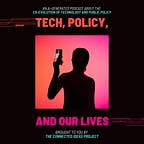It wasn’t that long ago—2018—that the biggest bioethics story in the world was CRISPR Baby Scientist Goes to Prison. The Chinese researcher He Jiankui announced the birth of twin girls whose genomes he had edited in an attempt to confer HIV resistance. The backlash was immediate and global: scientists condemned it, governments tightened oversight, and He was tried and sentenced to three years in prison. It was a morality play in three acts—hubris, outrage, punishment—and for a while, it felt like the ending was written.
Human embryo editing wasn’t just discouraged; it was radioactive. The mere thought of it conjured visions of “designer babies” and sci-fi dystopias. The conversation wasn’t about if we could do it safely or ethically—it was about whether we should be talking about it at all.
Fast forward seven years.
The podcast audio was AI-generated using Google’s NotebookLM.
Last week, a U.S. startup called Manhattan Genomics launched with the explicit mission to edit human embryos—not for hair color, height, or IQ, but to prevent inherited genetic disease before a child is even born. They are not hiding in the shadows. Their homepage opens with the line: “We’re building a future where no child inherits preventable disease.” Their ethics statement is unapologetic: “Ethics should be driven by reducing human suffering.” And they make their case plainly—if you can correct a deadly mutation at the zygote stage, you can prevent a lifetime of illness, avoid massive healthcare costs, and break the cycle of inherited suffering before it begins.
And here’s the kicker: the co-founder and head of science is Eriona Hysolli, the first head of mammoth biology at Colossal Biosciences—the same company I helped build, and whose core tools are designed for engineering large mammals. Which is exactly what we are.
When I worked at Colossal, we were advancing techniques to reprogram cells, edit genomes, and reconstitute extinct traits. It was thrilling, frontier science. But even then, I knew the inevitable truth: the moment these tools became reliable enough to engineer an elephant, they would be reliable enough to engineer a human embryo. The technical barrier between “mammoth” and “human” is vanishingly small. The barrier is—and has always been—ethical, cultural, and political.
Which is why I wrote Synthetic Eden.
We’re officially opening sign-ups for Advanced Reader Copies of Synthetic Eden.
All I ask in return is that you leave an honest review on Amazon and/or Goodreads on launch day: September 9, 2025.
I wanted to create a space where readers could grapple with this moment before it arrived. The story isn’t a thought experiment set in a distant future—it’s a Kobayashi Maru scenario for biology: the no-win ethical challenge where every choice is fraught.
Do we withhold a technology that could save humanity from extinction?
Or do we open the door to altering the human germline, knowing full well that once the door is open, it never closes?
Manhattan Genomics is not a hypothetical. They are here, operating in the U.S. and arguing for the revision of federal prohibitions like the Dickey-Wicker and Aderholt amendments. They aren’t promising utopia—they’re promising to do the work in the open, to bring in bioethicists, to seek FDA approval, and to limit their scope to disease prevention. And yet…
The technical promise and the ethical peril are now braided together. The public imagination has to catch up, fast, because these decisions will not be made in abstract white papers. They will be made in labs and clinics, in venture boardrooms, and eventually in family planning conversations around kitchen tables.
The future I wrote into Synthetic Eden is no longer speculative fiction—it’s the news cycle. And if we’re not ready to engage with it honestly, we’re not ready for what comes next.
Because here’s the truth: whether we like it or not, humanity has stepped into the role of our own evolutionary engineer. And once you accept that premise, the only real question left is—how far are we willing to go?
This is why I have always believed that:
At the frontier of technology, humanity is the experiment.
The question now is, who is designing the experiment?
Cheers,
-Titus
P.S. I think the reference to the Manhattan Project is unfortunate. The Space Race, the Human Genome Project, or so many other moonshots could capture the imagination. The reference to the Manhattan Project creates a very poor connotation for the future of this technology.













